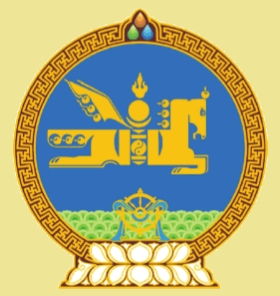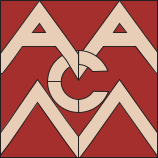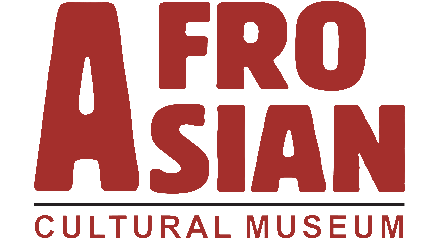Mongolia

National Flag
Mongolia is a landlocked country in East and Central Asia. It borders Russia to the north and People's Republic of China to the south, east and west. Ulan Bator, the capital and largest city, is home to about 38% of the population. Mongolia's political system is a parliamentary republic. The capital Ulan Bator is administrated separately as a khot (municipality) with provincial status. The predominant religion in Mongolia is Tibetan Buddhism, and the majority of the state's citizens are of the Mongol ethnicity.

Emblem
Profile:
Official Name - Mongolian People's Republic
Nationality - Mongolian
Chief City - Ulan Bator
Location - East-central Asia
Population - 2,951,786
Area - 1,564,116 km
Official Languages - Mongolian
Government - Parliamentary Republic
Currency - Togrog (MNT)
Independence - 29th December 1911

Map
national anthem
Darkhan manai tusgaar uls
Dayar Mongolyn ariun golomt
Dalai ikh deedsiin gegeen üils
Dandaa enkhjij, üürd mönkhöjnö
Khamag delkhiin shudarga ulstai
Khamtran negdsen evee bekhjüülj
Khatan zorig, bukhii l chadlaaraa
Khairtai Mongol ornoo manduulya
Öndör töriin mini suld iveej
Örgön tümnii mini zaya tüshij
Ündes yazguur, khel soyoloo
Üriin ürdee övlön badraaya
Erelkheg Mongolyn zoltoi arduud
Erkh chölöö jargalyg edlev
Jargalyn tülkhüür, khögjliin tulguur
Javkhlant manai oron mandtugai
TRANSLATION
Our unwavering independent nation
All Mongols' sacred ancestry
All world's good deeds
Always stable, forever continue
With all honest nations of the world
Strengthen our bonds
With all our will and strength
Let's develop our beloved Mongolia
Our great nation's symbol blesses
The people's fate supports
Our ancestry, culture and language
Let's forever cherish and prosper
Bright peoples of brave Mongolia
Have freedom and happiness
Key to happiness, column for prosperity
Our great country prosper


wresting

A typical Mongolian architecture - Yurt

A girl riding a horse
climate
Most of the country is hot in the summer and extremely cold in the winter, with January averages dropping as low as -30°C. The country is also subject to occasional harsh climatic conditions known as zud. Ulan Bator has the lowest average temperature of any national capital in the world. Violent earthquakes sometimes rock the country.
festival
The main festival is Naadam, which has been organised for centuries, consists of three Mongolian traditional sports, archery, horse-racing, wresting.
people
About 40 percent of the population live in Ulaanbaatar alone. Traditionally, the horse has been the most prized animal in Mongolia. They were accustomed to riding long distances, and people also accomplished with a bow and arrow, which they used for hunting and survival. Mongolia is also home to Przewalski's horse, the only true wild horse that exists today.
economy
Mongolia has rich mineral resources, and copper, coal, molybdenum, tin, tungsten, and gold. Livestock typically consists of sheep, goats, cattle, horses, and Bactrian camels Agricultural crops include wheat, barley, potato, vegetables.
languages
The official language of Mongolia is Khalkha Mongolian, which uses the Cyrillic alphabet, and is spoken by 90% of the population. The Russian language is the most frequently spoken foreign language.
music
The music of Mongolia is strongly influenced by Tibetan Buddhism and nomadism. The traditional music includes a variety of instruments and songs, “Koomi”: delicately trained male voices.In Mongolia, throat singing, style of music is popular, particularly in parts of Western Mongolia.
architecture
The traditional Mongolian dwelling is known as a yurt (Mongolian: ger) which represent Mongolian architecture.

Morin-khur




